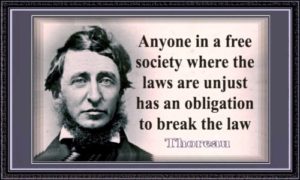St. Jean, Shawn. “Thoreau’s Radical Consistency.” Massachusetts Review 39.3 (1998): 341-57. JSTOR. Web. 24 October 2016.
For more than a century, critics of the AMERICAN TRANSCENDENTALISTS have debated and scrutinized the consistency of the writers’ philosophies and arguments. While some scholars often portray writers such as EMERSON and THOREAU as hypocritical, others venture to examine their seemingly hypocritical statements and connect these ideas with each Transcendentalist’s methodology in order to create consonance between one statement and another. Shawn St. Jean represents the later, and his essay seeks to articulate the consistency of Thoreau’s political stances, even if these stances seem contradictory on the surface. The methods St. Jean uses in order to advance his study include a meticulous scoping of three of Thoreau’s key political writings, a firm commitment to establishing and maintaining Thoreau’s ideals, and an emphasis on some opposing critics’ theories regarding Thoreau’s probable intentions.

St. Jean begins his essay by pointing out how critics in the early part of the twentieth century tended to avoid the topic of potential contradiction and paradox found in Thoreau’s philosophical/polotical work; however, critics in the later part of the century have been apt to denote Thoreau’s incongruities (341). According to St. Jean, critics often fail in their assessments of Thoreau’s inconsistencies; he feels that these perceived contradictions do not exist when the debate is redirected through the understanding of Thoreau’s own transcendental point of view (342). Using Thoreau’s “Resistance to Civil Government,” “Slavery in Massachusetts,” and three essays about John Brown, St. Jean identifies how Thoreau never fundamentally deviates from his agenda to avoid violence while seeking to establish reform and political radicalism. Overall, St. Jean notes, “Critics have, I believe, preferred to call Thoreau inconsistent rather than deal with the (to them, painful and embarrassing) fact that Thoreau himself never acted on his own endorsement of violence” (350). St. Jean consistently reports that Thoreau always maintained his philosophical framework, which reflected personal principles that people may enact, not endorsements for violence. This is the case even when Thoreau may have subtly declared that violence might be the only answer to solve America’s problems.

As far as America’s problems are concerned, the paramount concern for Thoreau involved slavery. Like the other transcendental writers, Thoreau felt that “all avenues to protect the rights of blacks, short of civil war, should be exhausted before that final [violent] option is adopted” (353). Emerson and Thoreau always attempted to make this priority known through their lectures and political writings. Emerson, in particular, endeavored to speak from the “heartfelt experience of a common person,” successfully articulating his points to “every dimension of American culture” (Miller 96). Likewise, Thoreau was able to express his thoughts and agenda toward the common man and the common good, and these political ideals, according to St. Jean, did not waver from his philosophies. For example, as St. Jean writes, “His [Thoreau’s] own ‘civil disobedience’ in not paying the poll tax and John Brown’s raids, in Thoreau’s mind, were only the extreme ends of a continuum defined by respect for individual human rights above all” (353). Taken from this key perspective, Thoreau’s continuity and authenticity do not deserve to be questioned.
Additional Sources:
Miller, Thomas P. The Evolution of College English: Literacy Studies from the Puritans to the Postmoderns. Pittsburgh: University of Pittsburgh Press, 2011. Print.
*To view the full text version of St. Jean’s essay, click the link below (ODU login will be necessary):
http://www.jstor.org.proxy.lib.odu.edu/stable/pdf/25091451.pdf
